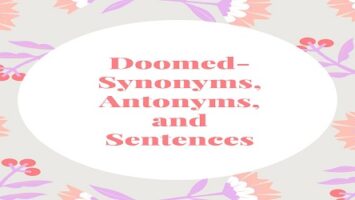Table of Contents
Do Not Go Gentle Into That Good Night:
Introduction:
“Do Not Go Gentle Into That Good Night” is a poem about on coming death. Most philosophers tell us to accept death meekly and death is seen as deliverance from this life on earth. Dylan Thomas’s poem is a protest against this timid acceptance. He urges his dying father to fight against death till his last breath, though he knows that ultimately death will triumph. The lines ‘Rage, rage against the dying of the light’ and I do not go gentle into that good night’ are refrains that are repeated alternately at the end of every stanza. The repetition of these lines forms the core of the poet’s protest against weak submission. It is almost as if a soldier were being given a send-off before going to battle.
Comprehensive Summary:
The poet regards life on earth as something sacred. Light symbolizes life. Death must not be allowed to find it easy to take this light, this sacred life. Even the old people should rise up in anger when they see the darkness of death approaching them to put out the light of life.
Wise men know that the darkness of death is inevitable. Their words cannot create light and remove death. But they too must not submit to the night of death meekly. The deeds of good men dance brightly even when they die. They should also fight against death. They could have done more good deeds if they had not been pulled into the darkness of death.
Adventurous men love this life and its bright light. They give fight to death till the very end. They do not accept the darkness of death easily. Grave men see the darkness of death gathering around them. Their eyes begin to go blind at the approach of that darkness. But, they should know that their eyes can yet shine brightly like shooting stars. The poet incites them to rise up in anger and fight death boldly till the very end. The poet’s father was suffering from cancer and death was hanging over him. The poet does not want him to die passively, meekly, and dejectedly.
Write a brief summary of the poem “Do Not Go Gentle Into That Good Night”.
According to the poet, even the old should put up a bold fight against the inevitable death. They must not feel tame before death even if it is approaching them.
The wise, the good, and the adventurous people should put up a bold fight against death until their last death. The grave and the sick people should not feel blind at the approach of death. They should feel that their eyes can still shine brightly like the shooting stars. Therefore, they should fight against death which takes the light of life from them.
The poet’s father’s death was imminent as he was suffering from deadly cancer. The poet did not want his dying father to accept death passively. The poem has a universal theme. The poet wants that man should show love for his life and fight against death fearlessly, boldly, and violently.
Explanations of Important Passage:
| (1) Do not go gentle into that good night, Old age should burn and rave at the close of the day; Rage, rage against the dying of the light. Reference: These lines have been taken from Dylan Thomas’s poem “Do Not Go Gentle Into That Good Night”. Context: The poem exhorts us not to submit to death meekly. One has to die, but one should fight death till the last. Explanation: In these lines, the poet says that even old people should not be meek at the moment of death. They should rise up in anger and give it a fight. They should try to save the last flicker of their light from falling into the darkness of death. |
| (2) Though wise men at their end know dark is right, Because their words had forked no lightning they Do not go gentle into that good night. Reference: These lines have been taken from the poem “Do Not Go Gentle Into That Good Night”. It is composed by Dylan Thomas. Context: In the preceding lines the poet says that all sorts of people should not be tame at the moment of death. They should try to save the last flicker of their light from falling into the darkness of death. Explanation- According to the poet, wise men know that death is inevitable. They are also aware that their words of wisdom fail to create any flashes of lightning and can’t dispel the darkness of death. But they do not accept death meekly. They show their heroism in the face of death. The tone of the poem reflects Dylan Thomas’s optimism. |
| (3) Good men, the last wave by, crying how bright Their frail deeds might have danced in a green bay, Rage, rage against the dying of the light. Reference: These lines occur in Dylan Thomas’s poem “Do Not Go Gentle Into That Good Night”. The poem suggests that we should not submit to death meekly. Our attitude should be one of courage and fearlessness even in the face of death. Context: In the preceding lines the poet says that death is inevitable. Even wise men can’t escape it with their words of wisdom. But they face death heroically. They do not surrender tamely. Explanation: In the given lines the poet brings out the attitude of good men towards death. They think that if they lived longer they would do more good deeds. Hence, they stand up furiously and fight against death. They prefer a violent fight against death to an abject submission that smacks of cowardice. |
| (4) Wild men who caught and sang the sun in flight, And learn, too late, they grieved it on its way, Do not go gentle into that good night. Reference: These lines have been taken from Dylan Thomas’s poem titled “Do Not Go Gentle Into That Good Night”. Context: In the preceding lines the post says that the wise men think that if they lived longer they would do good deeds. So they fight boldly with death. Explanation: In these lines, the poet tells about adventurous people. Suddenly they find themselves surrounded by the darkness of death. But, they do not go easily into the endless darkness of death. They fight back boldly to avoid death. They may and may be able to dodge death, but they never submit to it tamely and passively. They cease to be pessimistic in their outlook. |
| (5) Grave men, near death, who see with blinding sight Blind eyes could blaze like meteors and be gay, Rage, rage against the dying of the light. Reference: These lines have been taken from the poem titled “Do Not Go Gentle Into That Good Night”. It is composed by Dylan Thomas. The poem brings out the heroism of mankind in not accepting death passively. Context: In the preceding lines the poet tells us how the adventurous people fight back the darkness of death. Explanation: In these lines, the poet says that the eyes of the sick and serious people nearing their death go blind in the surrounding darkness of death. The poet says that if they fight back death their eyes can still shine like shooting stars. They must not accept death meekly. They should rise in anger and give a serious fight to death till the very end. The poet urges mankind to show heroism and dauntless spirit even in the face of death. |
| (6) And you, my father, there on the sad height, Curse, bless, me now with your fierce tears, I pray. Do not go gentle into that good night. Rage, rage against the dying of the light. Reference: These lines have been taken from the poem titled “Do Not Go Gentle Into That Good Night”. It is written by Dylan Thomas. Context: In the preceding lines the poet says that old people have a ray of hope to avoid death if they determine to fight against it up to their last breath. They should not submit themselves to death easily without fighting back. Explanation- In these lines, the poet says that his father is about to die. He seeks his blessing and doesn’t want that his father should accept death easily and meekly. He wants that his father should give a bold fight to the death. His father may bless or curse him, he should do that without reflecting any feelings of fear and despair in the face of death. |









Comments (No)